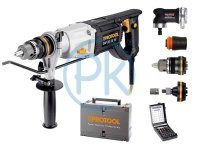Lime green
Member
- Joined
- Sep 3, 2021
- Messages
- 64
mino said:Some history lesson:Lime green said:I'm confused. Doesn't the TPC have more torque than the DRC/PDC? If so, how are those considered construction site tools? As far as protecting the user, both the Hilti and Metabo have torque control to protect your wrist, so I don't see how the Festool offers an advantage over those brands.
The DRC/PDC series were developed back in 1990's for the Festool's sister Protool brand which focused on Construction and Industrial applications. The same as the DR 20 drill and some other tools which are -today- branded as Festool.
The focus of the Protool brand being construction, the design of the tools was NOT for finnesse first, power second like Festool. It was the opposite. Power first, finesse (and safety) second.
TTS, the parrent company of Festool created the Protool Brand from the Czech Narex industrial tools portfolio they bought in 1997 augmented with a collection of specialist tools from smaller German makers.
In 2013 TTS discontinued the Protool brand, as it did not work economically and "switched" over those tools which sold well to the Festool and Narex brands. DRC/PDC were some such tools.
What this means is that -when introduced- the DRC/PDC were some of the most powerfull drills on the market. They not only had a very high top speed at 3800 rpm but ALSO a very high (hard) torque at around 80 Nm. They did include a safety current limiter but that was -not- to protect the user but the drill. The DRC will twist your arm in no time ... When under heavy load, the DRC/PDC will SLOW DOWN but will NOT turn off. This is as with the other "raw power" drills from the likes of Makita, Dewalt etc. with which the drill was designed to compete. Then.
Now, the TPC -does- have a 40% stronger MOTOR, BUT:
- it also has about 25% higher lowe speed setting /so 25% of your addl torque at the motor goes for higher low speed/
- it has a pretty conservative torque break
This combined means that:
- at low speed, the TPC can *sustain* about 15% higher loads, like when you are mixing concrete style loads ..
- the TPC WILL STOP BEFORE the DRC/PDC would - since their "hard torque" is higher than the TPC torque break would allow
In short:
The TPC is a "Festool", designed for excellent controlability and usability. It is better at this compared to the DRC/PDC series.
The DRC/PDC were "Protool" rebranded as Festool, designed for high power /for the time/ with passable usability. This means a PDC is slightly better at "raw power-almost-blocking use" like the torque tests while it will be worse in everything else.
Hope helps. The TPC is really a different beast to the "other drill drivers" on the market. In the same way a CXS is a different beast to everything else on the market in its class. When these fit your task/workflow, they are almost unbeatable at it.
But they are no raw-power monsters. To see that it is enough checking the torque officially specced for the TPC on the Festool site. If you need raw power, there are other brands to serve you.
Thanks for the explanation. I've come to the conclusion that maybe this is something that I'm still interested in, in addition to what I already have. I might just keep a higher torque drill in my truck as a backup if needed.


